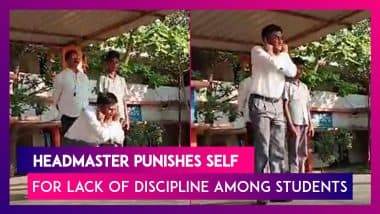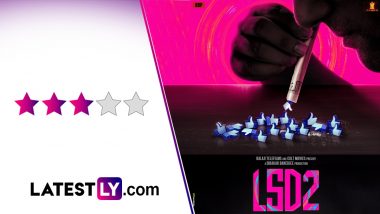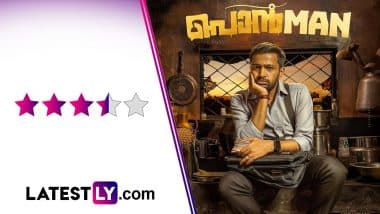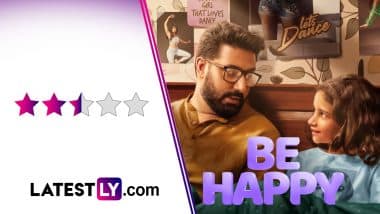Love Sex Aur Dhokha 2 Movie Review: I remember going to watch the first Love Sex Aur Dhokha film in a theatre with my friends, expecting it to be a titillating experience (I apologise for the horniness of my '20s), but we came out of the hall, impressed and traumatised at the same time. Although I had loved Khosla Ka Ghosla - Dibakar Banerjee's debut film - my respect for him as a filmmaker grew multifold with LSD. The first Love Sex Aur Dhokha was also the starting point for some of the present talented stars like Rajkummar Rao, Nushrat Bharucha, Amit Sial and Anshuman Jha, so we also have that to be thankful for the film. Love Sex Aur Dhokha 2 Review: Dibakar Banerjee's Bold Film Receives Lukewarm Response From Critics.
The first LSD came at a time when human civilisation was in the process of being entrapped by the revolution of the digital age and social media, and did a convincing job of presenting its pitfalls. At the same time, the film also addresses social evils that refuse to go no matter what age we are in, like, honour killing, caste discrimination and sexual assault.
Now, 15 years later, Dibakar Banerjee (who himself was allegedly implicated in a #MeToo case) has come up with a sequel in a time when the world is completely consumed by social media, VR and AI, and there seems to be no escape. Love Sex Aur Dhokha 2 is a scathing indictment of the times we live in, where we forget our daily traumas to TRP-garnering antics of reality shows or idolise anti-social elements who amassed millions of followers by doing shite that would have once gotten us beaten by our parents.
Watch the Trailer of LSD 2: Love Sex Aur Dhokha 2:
What Works Overall
Is Love Sex Aur Dhokha 2 better than the first film? The answer, like the movie, is complicated. I'm certain that LSD 2, written by Banerjee, Shubham, and Prateek Vats, poses a far greater challenge for the director than the first, especially in terms of presentation as it attempts to recreate the near-surveillance state in which we live. At times, we don't perceive through any camera lenses - a gimmick of these movies - but instead, it's the characters' eyes that become our literal point of view. The film's portrayal of reality show antics, influencer culture, and the metaverse presents storytelling challenges that LSD 2 certainly rises to. However, what's even more commendable is Banerji's focus on the LGBTQ+ community, addressing homophobia, hyper-masculinity, and opportunistic wokeness, even if it is presented with some flaws.
What Doesn't
Yet, I missed the gut-wrenching impact that the segments of the 2010 film possessed. In the sequel, I felt the writing doesn't bring the same strong influence to offer a lasting impression, like the heartbreaking way in which the first two segments of 2010's LSD ended. The sequel is still radical, bolder, and even more satirical. The presence of celebrities like Mouni Roy, Anu Malik, Tusshar Kapoor (a reminder of who the producers are), Sophie Choudry, and, best of all, Uorfi Javed (in a self-deprecatory cameo that takes potshots at a culture that made her a social media star) adds a meta flair to the proceedings. Above all, though, watch out for the fantastic performances from the three lead actors in each segment - Paritosh Tiwari, Bonita Rajpurohit, and Abhinav Singh.
Love
Like the first film, LSD 2 is an anthology of three vignettes that aren't entirely disconnected but influence each other in one way or another. The first segment, Love/Like, revolves around a trans contestant named Noor (Paritosh Tiwari) participating in a reality show called 'Truth Ya Naach', which is a cross between Bigg Boss and India's Got Talent, I guess. Noor adeptly navigates the game, understanding her followers well and employing manipulative tactics to gain popularity. This includes bringing her mother (Swaroopa Ghosh) onto the show, despite her mother still grappling with Noor's gender transformation, and even instigating her onscreen partner to kiss her live on television. The line between fiction and reality blurs to the point of being invisible as the cameras roll; when Mouni Roy defends Noor against an unseen caller, we question whether her reaction is genuine or merely for the cameras.

However, it's when the cameras are off—the reality show offers this option—that we glimpse Noor's real struggles and her strained relationship with her mother (a point reiterated by one character). Director Banerjee effectively captures the cheesy melodrama of reality shows in this segment, incorporating every cliché from on-camera conflicts to repetitive reaction shots to contentious judges. While one might hope that the presence of a certain 'celeb' playing a parody of himself, who later preaches about respecting mothers and women, serves as a satirical commentary on his real-life persona, especially given his involvement in the #MeToo movement (allegations made by three popular singers no less), sadly, we all know this isn't the case. Do Aur Do Pyaar Movie Review: Vidya Balan and Pratik Gandhi Excel in This Saucy Yet Mature Take on Relationships.
Love/Like deserves credit for addressing the challenges faced by trans individuals in asserting themselves within popular culture. However, it falls short of transcending the farcical nature of the reality shows it satirises, largely because our reality shows are already so absurd that they border on self-parody.
Sex
The second segment, Sex/Share, presents a straightforward narrative that delves into the phenomenon of slacktivism among the privileged, particularly concerning those who are oppressed by society. Here, the cameras serve not as an organic element of the story, but rather, similar to Aneesh Chaganty's Searching or Mahesh Narayanan's C U Soon; they serve as a screenlife visual framing.
It begins with Kullu (Bonita Rajpurohit), a transgender employee at a metro station, who is discovered severely beaten and assaulted in wastelands. Lovina (Swastika Chatterjee), a senior officer in the organisation that contracts employees like Kullu, decides to take up the legal battle on Kullu's behalf. It is established from the outset that the pursuit of justice is merely a distraction to divert media attention away from corruption charges against her company. Meanwhile, Kullu is more focused on moving forward with her life alongside her live-in partner, showing little concern for what has happened to her.
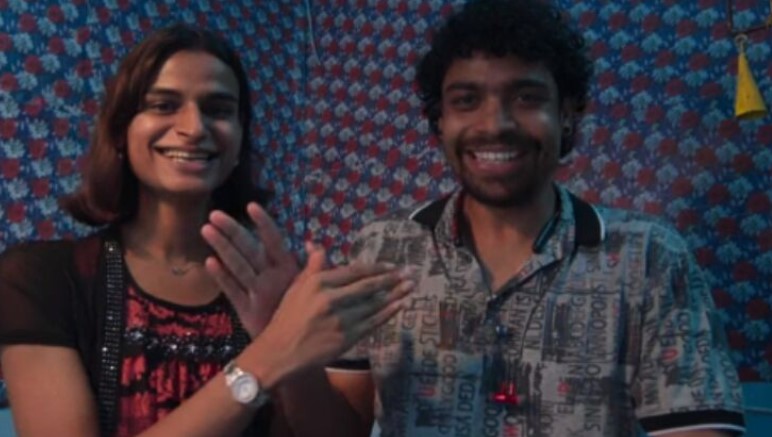
While this segment takes critical jabs at armchair activists and keyboard warriors, it also subtly undermines the #MeToo movement. I understand why Kullu chooses not to pursue action against her assailant, with the film shedding light on the challenging living conditions faced by the transgender community. However, portraying armchair activism as potentially more damaging to survivors than the assault itself feels somewhat hypocritical. You know why. Even, the poignant manner in which Sex/Share concludes doesn't break your hearts, because the segment doesn't give us time and space to relate to these characters.
Dhokha
The final segment - Dhokha/Download - is, in my humble opinion, the best segment in Love Sex Aur Dhokha 2. Dhokha/Download revolves around an immensely popular gaming YouTuber, Shubham (Abhinav Singh), known among his followers as Gaming Paapi, and depicts what happens to him when someone hacks provocative images and videos into his sessions. While they turn him into a joke for his followers, Shubham's popularity and followers increase multi-fold, leading to more sponsorships and deals. But Shubham's mental health takes a major hit as the hacks continue to happen, dismantling his carefully cultivated toxic-masculine image.
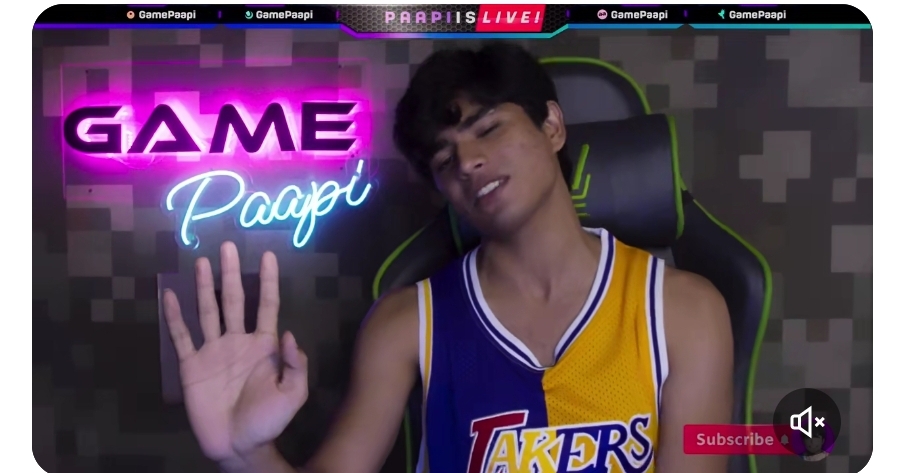
Dhokha/Download works well as a biting satire on influencer culture, which breeds the likes of those popular 'youth icons' who secure that Bigg Boss ticket and get garlanded by politicians, while police file cases against them on other charges. The segment delves into the drugs, sex and abuses culture propagated by these icons, the mindless initiation by followers in the name of 'trends', and also the culture of violence - an investigation of a schoolboy murder, touched upon in the previous shorts, finds its culmination here. It also illustrates how Artificial Intelligence and Virtual Reality have seeped into our lives so much that it is hard to distinguish what's true and what's not. The best part is, however, how Dhokha/Download shows the power of cult following and the media's role in propagation, presented through a hilarious parody of a certain popular female TV news anchor known for peddling propaganda. The conclusion is quite offbeat but impactful, nevertheless.
Final Thoughts on LSD 2: Love Sex Aur Dhokha 2
From a storytelling perspective, LSD 2: Love Sex Aur Dhokha 2 is a challenging endeavor to which Dibakar Banerjee has successfully risen. He has crafted a sharp satire on modern-day Indian society employing advanced visual gimmicks that were instrumental in the success of the first film. Simultaneously, the makers deserve commendation for placing transgender characters and actors at the forefront, sensitively revolving the narratives around them. However, where LSD 2 falls short in comparison to its predecessor is that the evolved story-framing and satire come at the expense of the stories themselves, not allowing them to leave a lasting impression on the viewer.
(The above story first appeared on LatestLY on Apr 19, 2024 02:59 PM IST. For more news and updates on politics, world, sports, entertainment and lifestyle, log on to our website latestly.com).






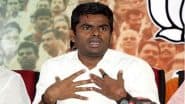
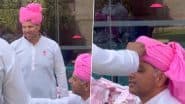





 Quickly
Quickly








